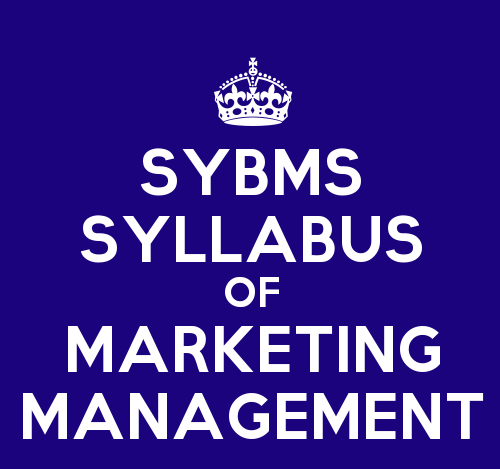Teaching Hours and Assessment Pattern of Marketing Management:
- No. of sessions of 90 minutes – 30
- No. of sessions of 90 minutes per week – 2
- Continuous assessment – 40 IA
- Semester End examination -60 IA
- Total marks – 100
- Duration of theory paper – 3 hours
- No. of credits – 2
The detailed syllabus of marketing management is as follows:
Introduction to Marketing:
- 4Ps and 3 Cs of marketing
- Marketing as an activity, function and philosophy
- Needs, wants and demands, transactions, transfers and exchanges
- Orientation of a firm: production concept, product concept, selling concept, and marketing concept.
- New trends in marketing – e-marketing, internet marketing, marketing using social networks
- Societal marketing / relationship marketing.
- Marketing research, MIS, consumer behavior
- Micro environment of business – management structure, marketing channels, markets in which a firm operates, competitors and stakeholders.
- Macro-environment – political factors, economic factors, socio-cultural factors, technological factors PEST analysis.
Marketing Research:
- Importance of marketing research
- Types of marketing research
- Product research, sales research, consumer / customer research, promotion research.
Consumer Behaviour:
- Basic stimulus response model
- Influence on consumers decision-making process
- High involvement and low involvement products
- Influences on buying behavior – cultural factors, social factors, personal factors and psychological factors – Maslow’s Hierarchy
- Methods of sales forecasting
- Industrial buying behavior, product and brand management, STP,
- Industrial buying behavior
- Decision making process
- DMUs and its composition – factors influencing purchasing: economic environment, organizational factors, inter-personal characteristics and individual buyer characteristics
- Key differences between consumer and organizational buying
Product and Brand Management:
Products –
- Core,
- Tangible and
- Augmented products.
- Product mixed decisions:
- Product line decisions,
- Strategic filling,
- Line modernization decisions.
- New product development process,
- Idea generation,
- Screening,
- Concept development and testing,
- Marketing strategy,
- Product development,
- Market testing,
- Test marketing,
- Commercialization.
Product life cycle:
- Introduction,
- Growth,
- Marketing,
- Decline.
Brand Management:
- Brand equity,
- Branding decisions,
- Brand extensions,
- Brand portfolios
Segmentation, Targeting and Positioning (STP):
- Geographic,
- Demographic,
- Psychographic,
- Behavioural segmentation variable for industrial markets,
- Customer location,
- Type of industry,
- Size of the firm,
- Purchase criteria etc.
Targeting:
- Undifferentiated marketing,
- Single segment and multi segment structures,
- Guidelines for selecting target markets.
Positioning:
- Identifying frame of reference,
- Points of parity and points of difference,
- Choosing category membership,
- Product and brand differentiation for indentifying of position
- Pricing decisions,
- Channel decisions,
- Promotion mix,
- Strategies,
- Integrated marketing,
- Communications,
- Marketing services,
- Ethics in marketing.
Pricing Decisions:
- Pricing objectives,
- Factors influencing pricing decisions
- Types of pricing
- Mark up or cost plus pricing
- Perceived value pricing
- Value pricing
- Geographic pricing
- Responding to competitors
- Action through price and non price variables
- Impact of the products – stage in the PLC on pricing decisions.
Channel Decisions:
- Types of channels;
- Intensity of distribution,
- Channel conflict and
- Channel management.
- Retailing importance,
- Types of retail formats,
- Indian retail scenario,
- Promotion mix,
- Advertising – importance and scope
- Sales promotions – objectives
- Consumer promotions
- PR and publicity
- Personal selling: recruitment, selection, training, motivation and evaluation of sales reps.
Integrated Marketing Communication:
- Definition of target audience,
- Determining communication objectives,
- Designing communication and
- Selection of channels.
Marketing Services:
- Characteristics of services,
- Ways of improving services,
- Delivery,
- Managing service maturity.
- Ethics in marketing:
- Advertising Standards Council of India – code of ethics in advertising,
- Promotion to children,
- Unfair practices in marketing.
The list of reference books of Marketing Management is as follows:
- Marketing Management – A south asian perspective – Kotler, Keller, Koshy and Jha
- Marketing Concepts and Cases
- Marketing Management – Pearson Education
- Principles of Marketing – Kurtz Boone
- Marketing Management – S.H.H. Kazmi
- Marketing Management – Kerin Hartley
- Marketing Management – Ramaswamy and Namakumari




49 Comments